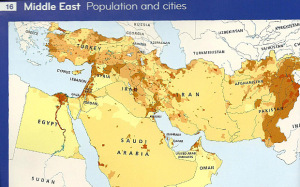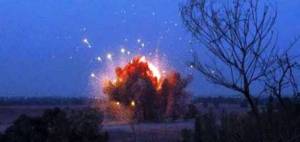By Ashley Repp
News Desk Reporter, Middle East
It is no secret that Middle East relations, particularly those between Israel and its neighbors, are particularly tumultuous. Israel and Palestine have been embroiled in a struggle for the land that is currently recognized as Israel, Gaza, and the West Bank, for over 60 years. As of 1948, the international community, including international governmental bodies, such as the United Nations, has acknowledged the legitimacy and sovereignty of Israel. But while this legitimacy is acknowledged by many international actors, it is not universally accepted, particularly by other Middle East countries.

Map making company Collins Bartholomew, a subsidiary of HarperCollins, responded to buyers of school supplies for English speaking schools in the Middle East by releasing an edition of a map of the Middle East that does not label the region typically recognized as Israel with the name Israel. Instead, it labelled as Gaza and the West Bank. As some of Israel’s neighbors do not acknowledge Israel’s legitimacy, or allow maps into their respective countries that label the disputed land as Israel, Collins Bartholomew took a chance with buyers with this release of the map of the Middle East.
Many are outraged by Collins Bartolomew’s response to map buyers who refuse maps labeled with Israel. The company asserted that the decision was merely to appease opposed buyers and appeal to local preferences. The Tablet, a Catholic organization, contended that the decision by the company to omit Israel to appeal to the palette of specific buyers, only serves to undermine peace and de-legitimize Israel’s presence in the Middle East.
On the other hand, the company did not label the region Palestine, rather labelled the region by two, longstanding names of specific parts of the area, Gaza and the West Bank. While topically, the decision seems confusing and irrational to many, particularly to those who recognize Israel’s right to exist, on a deeper level, the decision appears to acknowledge that all countries have different understandings of what is right, wrong, legitimate, and acceptable. In responding to a known preference of some countries in what they choose to recognize, Collins Bartholomew created this controversial map.
The company has now responded to the outcry against this map by ceasing sales, and destroying the remaining stock of the map. The situation begs the question, will the bath the company must now take on the production of this map, in combination with lost sales from angry buyers, be worth the initial production of the map for a select number and group of buyers. From a business perspective, the decision to produce the map seems odd and irrational, from a social perspective, the map speaks volumes about current sentiments and anger regarding the existence of and legitimacy of Israel.
For more information, please visit:
The Telegraph- HarperCollins omits Israel from school atlas– 31 Dec. 2014
The Washington Post- HarperCollins omits Israel from maps for Mideast schools, citing ‘local preferences’– 2 Jan. 2015
The Independent- HarperCollins pulls map excluding Israel from sale amid accusations of ‘anti-Semitism’– 2 Jan 2015
Haaretz- HarperCollins omits Israel from atlases sold to English-speaking Mideast schools– 31 Dec. 2014


